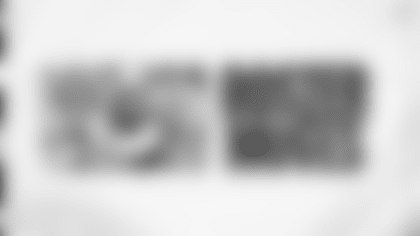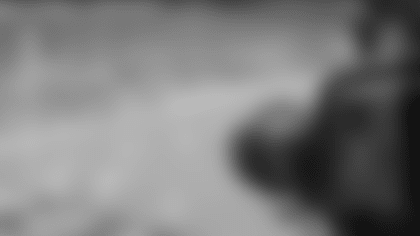Q: What did you see on film from the three long plays your defense allowed for scores last night? Were they breakdowns in scheme or just individual assignment issues?
BB: I'd say there were a lot of problems on all of those plays. Just obviously bad, so we need to do a lot better on that. We'll just have to correct a lot of things there and see if we can move forward and get better.
Q: Can big plays like that in preseason become teaching moments for your team and players?
BB: Well, we don't have any defenses where we want to give up plays like that. So yeah, there are a lot of things we did wrong and there are a lot of things we need to correct, need to be corrected, need to coach better, need to play better, need to do everything better – certainly not one guy. There are a lot of things that weren't very good on all of those plays.
Q: Following the game, Jimmy Garoppolo was asked about the discrepancy in his practice and game performances and said he didn't think there was any reason to it. How wide, if at all, do you view the discrepancy between his performances?
BB: As I said last night, I think that every player, and every coach for that matter, did some good things and had some not so good things, things they'd like to have back. That's the way it is in practice. That's pretty much the way it is every game. There are always going to be things you'd like to have back, do a little bit differently in all of those settings, both practice and games. We'll just try to learn from them and either not let them happen again or learn how to make a play. You can always make a better play.
Q: When Rob Ninkovich retired it was mentioned that having a backup long snapper can help a coach sleep at night. Conor McDermott was seen practicing some snapping before the game began. Is that something he has familiarity with?
BB: Yeah, well we had a couple of guys working on that. Depending on how things go during the year, what players are on the roster, what players are active, maybe we'll have more than one option or maybe we won't. We'll just have to wait and see, but that will always be something that you would go into the game with – who would get you out of the game as the backup snapper, backup kicker, backup punter and so forth.
Q: How did Jacob Hollister land on your radar? Were you scouting his brother, Cody, and then came across Jacob as a result?
BB: Well, as I've mentioned, I think we start off with somewhere in the neighborhood of four thousand players, or whatever it is. It's a very high number – all of the draft eligible players in the senior class and all of the different schools. Wyoming had a very good football team, had a number of pro prospects. They have some more this year, so that's no secret. It's a good program and they play good competition. He had a good spring workout. We also worked out his brother at Arkansas and then Jacob actually trained at Arkansas with his brother in the spring. Obviously, he was pretty committed to playing football, was in a good training program and when the opportunity came after the draft to fill out our roster, he was one of the players that we approached and we were fortunate to be able to sign him.
Q: What has he shown you thus far as far as handling the various responsibilities that come with playing tight end in this offense?
BB: Right. Well, it's not an easy position in our offense. There are no easy ones. But he's done a good job of adapting to the things that we've asked him to do. He's learning. He's got a long way to go. There are a lot of things that he needs work on in all phases of the game, running game, passing game, kicking game. But he's a hard working kid. He's out there every day and he's made improvement. Had an opportunity to make a couple of plays last night and made them so that was good.
Q: Did Deatrich Wise Jr. leave the game yesterday due to a concussion and was he placed in the concussion protocol? Do you have any update on his status?
BB: No updates; no.
Q: How do you plan on using these next few days before traveling to West Virginia to practice against the Texans? Do you envision the practices with them being similar to the ones you just finished with the Jaguars?
BB: Well, I think we've had a pretty good stretch here from the start of training camp. We've been in pads on all of the days that we've practiced other than the day before the Jacksonville game and the first two days of camp. We've had a lot of padded practices. We're going to take a couple of days here and give the players an opportunity to get their legs back under them, try to take care of some of the bumps and bruises and so forth that we've accumulated through camp. Monday we'll get some things that we need to get done accomplished as well as start to prepare a little bit for Houston there – a different style and type of offense, defense and kicking game than what we saw from Jacksonville, so just so we give our players a little bit of an introduction to that so that when they go down there we can have the most productive practice and experiences possible instead of wasting two days trying to figure out what they're doing. We'll try to, again, give that to the players a little bit on Monday so that we have some idea how we want to do certain things. Was there another question on that I forgot?
Q: Do you expect the practices with Houston to be similar to the ones with Jacksonville?
BB: No, I think they'll be a little bit different. Bill [O'Brien] and I will probably work some details out. We definitely will work some details out before we get started. We've talked kind of in general terms and we have a general format but I'm sure there will be some specifics. This situation is a little bit different than most other ones that we do. We did this with Tampa Bay where we worked with them and then played a game against them early in the season, so a similar situation with Houston. It's a little bit different than practicing with a team that you don't play or that you're just going to play in preseason and you're not going to see them again during the regular season. This one's a little bit different. Bill and I, we'll talk and we'll agree on a format. Again, the most important thing for us this week is to get better as a football team and to make improvements individually, make improvements collectively on our team that'll help us over the course of the season. It's not to try to just gain an edge on one particular opponent. The idea is to try to help our team over the long haul and evaluate our players. I'm sure that he has similar goals in mind. We'll find a way that we feel is mutually beneficial to be able to do that. I have a lot of confidence in our relationship and our ability to be able to put something together that will be productive, and at the same time not overly sensitive in terms of compromising the competition that we'll have early in the season.
Q: What did you see from Dion Lewis last night and how has he looked overall since being a year removed from his knee surgery?
BB: Dion's had a good spring and a good summer, worked very hard in the offseason program, got an opportunity to do some things last night. I thought he was very competitive, made some plays in the running game and in the passing game. Just overall an opportunity for backs to just sharpen up their skills, their run reads, getting tackled, dealing with contact, making those quick decisions with the ball in their hands that you practice in practice, but we all know it's not quite the same as game situations, especially the tackling and contact part of it. I think it's good for those guys to get used to that, so the first one isn't in a regular season game and they're not used to it. Hopefully, this will help to break them into that.
Q: Jacoby Brissett mentioned that he needs to work on his mechanics due to some throws that sailed high last night. With the quarterback position, is there ever a case of not wanting to tinker with a guy's mechanics too much because each quarterback has their own individual throwing motion?
BB: Right. Well, I think that's a good question, Phil [Perry]. I think anytime that you look at an individual skill such as passing, kicking, punting, a golf swing, something like that, that each person – their physically ability is a little bit different. Their mechanics may have some variation and so there are a lot of different I would say styles. You look at the golf tour – not every swing is exactly the same but all of those guys are pretty good. I think what you try to teach in that situation, and I've talked to people who coach those specific skills like that, and when I was the special teams coach and coached punters and kickers, that there are certain fundamentals that are inherent and good in good passes, good kicks, good punts, the way that the ball is released and the angle and the spin on the ball and the delivery and so forth. The same thing is true, as I said, in golf or punting or place kicking. I think you try to teach the players the basic fundamentals and if they can adjust their mechanics in a way to improve and still feel comfortable with it, then we try to do that. And if it's an adjustment that they're really not comfortable making for whatever the reasons, then I think you just have to decide if you can live with what the deficiencies are in the mechanics and look at if the punts are good but they're done in a little bit of an unorthodox way and they've satisfied what you want the punter to do, then you're probably going to be happy with it. If they don't and you can't change it because that's just not the makeup of the player, then you're probably not going to be happy with it. I'm sure that extends to other players, too. There are players that use techniques and do certain things that you wouldn't coach a player to do if you were starting him off or if you were talking to a group of players and you'd say "OK, this is fundamentally the way we want to do something." It's the exact opposite of the way that another player is doing it, but the player is very successful doing it that way and so you don't change the guy who has his own way of doing it if he is successful and he's productive. But at the same time you wouldn't necessarily start from scratch and teach a player who has kind of a blank slate to do it that way because fundamentally you see some flaws in it. I'd say the biggest lesson or experience I learned on that was with Everson Walls when I had him with the Giants. He came from Dallas and he had a very unorthodox way of covering in man-to-man coverage and his footwork was unorthodox, his eye control was, again, not something that you would teach. That's probably because not a lot of guys could do it. But he had his way of doing it and he could do it pretty well and one of the first things I told Everson was "I'm not going to try to change your style but you have to understand what your responsibilities are on the defense and you have to perform those responsibilities, but I'll give you some latitude in the technique and the style as long as you can get the job done." He said "OK, I fully understand that. I want to meet the requirements of the position on the defense on a particular call, but let me do it my way and I'll get it done. I don't know if I can do it your way because I've been doing it this other way for so long. I said "That's fine," and the guy had – whatever he had, 60 interceptions – or however many it was. It was a lot. He played very well for us and, as I said, I learned a lot from Everson because he just did things differently than any other defensive back on the team, or in all honesty, really any other defensive back I've coached. But he knew what he was doing. He knew where he had to compensate, and generally speaking, he got the job done on a very high percentage basis. I learned to accept that, but at the same time I had to coach the other players. "Look, this player has a lot of experience doing it a different way. I'm going to let him do that. I'm not going to coach you to do it. I'm not going to really allow you to do it. I want you to follow a fundamental sequence that I think is more of the right way to progress it." All of the players in the room understand that – Mark Collins and Perry Williams and [Myron] Guyton and [Greg] Jackson. They all understood that, that it was different, but they knew they couldn't do it that way, and again, Everson had a lot of experience doing it. It's a long answer to a short question, but that's kind of how I look at that. Those individual skills – there is certainly a guideline and a way that I think and I believe in that they should be coached, but if it screws the player up more than it helps them, then that's not really good coaching. Then I think you're better off letting them do it how he's most comfortable doing it. There's definitely a give and take on an individual skill like that.





































